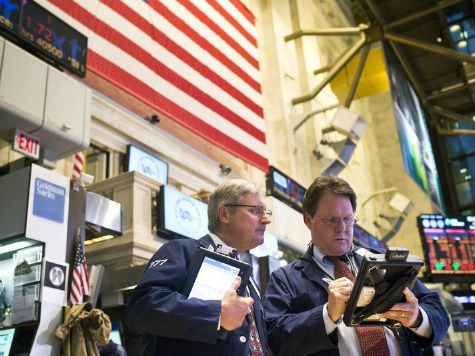
The Russian stock market sufferedan 11% loss overnight in reaction to a run on bank deposits fed byrumors the European Union and the United States would apply Cold War-typesanctions to punish Russia’s invasion of Crimea.
The price collapse was worst for bank stocks, withthe Sberbank (nation’s largest) falling 17% and VTB (second largest) falling20%. The turmoil caused stocks aroundthe world to fall modestly, with markets in Europe falling 3% and Americanstocks falling 1% at openings.
Themarkets’ reaction so far seems similar to the effect of Russia’s 2008 invasionof the nation of Georgia. Despitethreats of economic retaliation, there is very little the US and EU can do because Russia will continue to be the mainsupplier of Europe’s natural gas.
Economists refer to modernbank runs as “capital flight,” because, electronically, billions of depositors’ dollarscan be withdrawn via the internet in microseconds. The Central Bank of Russia just raisedinterest rates by 1.5% to try to prevent a compounding effect from more lossesor a devaluation of the Russian ruble currency.
However, Russia should not fear sanctions or need an IMF bail-out becauseit is the world’s largest producer of oil and the second largest producer ofnatural gas. It sells largely to Europe,which buys 30% (5.5 tcf) of the 19 trillion cubic feet (tcf) of gas and lots ofoil produced by Russia.
Russia’s Gazprom Corporationproduces 75% of the nation’s natural gas and has a monopoly over exports to WesternEurope through three main pipelines. Gazprombadly wants new sources of gas and access to new markets in Europe. The International Energy Agency estimates thatGazprom needs to spend $730 billion by 2035 merely to replace most of its current production of natural gas. Much of Gazprom’s 350 tcf of reserves are in barely accessible places such asthe Yamal Peninsula, the Far East and Eastern Siberia. The plan was for the EU to provide much of thefinancing for this effort, and the US would provide much of the technology.
Germany was so confident of its future economic relationship with Russia and Gazprom that it announced plans on May2011 to abandon 17 nuclear power plants by 2022 and relyon Russian natural gas and renewable energy sources. According to Chancellor Angela Merkel, “Webelieve that we can show those countries who decide to abandon nuclear power -or not to start using it – how it is possible to achieve growth, creating jobsand economic prosperity.” Germany hassince made no investments in its existing plants and has started the shut-downprocess.
Three years earlier in August 2008, Russian forces invadedGeorgia. Sen. John McCain reactedstrongly, but then-Senator Barack Obama’s reaction was described as limp-wristed. The atmosphere among the American media was atfirst poisonous, but over time a blame-the-victim mentality became rife. Two months later, The New York Times suggested thattiny, democratic Georgia was responsible for provoking Russia. European fact-finders went so far as to blame GeorgeW. Bush for provoking Russia by celebrating Georgia’s democracy and itsefforts to promote freedom and liberty.
Immediately after the US elections in November, RussianPresident Dmitry Medvedev, in a rare moment of honesty, revealedhis reasons for invading Georgia. According to RadioFree Europe/Radio Liberty, he suggested to a group of military officersthat Russia’s goal was to prevent Georgia from joining NATO: “We have simply calmed some of our neighborsdown by showing them that they should behave correctly in respect of Russia andin respect of neighboring small states. And for some of our partners, includingfor the North Atlantic Alliance, it was a signal that before taking a decisionabout expansion of the Alliance, one should at first think about thegeopolitical stability. I deem these [issues] to be the major lessons of thosedevelopments in 2008.”
Georgia demonstrated that the American left will throw anysmall ally under the bus and that the Europe Union would rather stay warm than clampon sanctions to cut off Russian oil and gas purchases. The turmoil in the stock market might lastfor a few more days, but this too will pass.
The author welcomes feedback @ chriss@chrissstreetandcompany.com. Chriss Street is teaching microeconomics at University of California, Irvinethis spring from March 31 – June 8, 2014.Call Student Services at (949) 824-5414 or visit http://unex.uci.edu/courses toenroll!

COMMENTS
Please let us know if you're having issues with commenting.